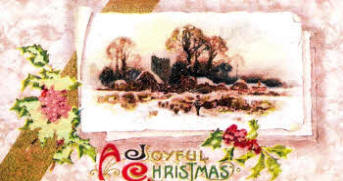
Hope amidst poverty - that was Christmas 100 years ago
by THE DIGGER
 |
|
A Christmas Postcard bearing the postmark - Bath - 25th December 1910 wishing the recipient "A Joyful Christmas." |
CHRISTMAS 100 years ago could have been considered a feast or a famine, depending on the individual's circumstances.
Local agents for the Raleigh Cycle Company were advertising a full range of new bicycles for 1911 including the "all weather model," selling for a whopping nine guineas. It featured Dunlop tyres, Roman aluminium rims and metal gear casing. For an extra two guineas you could be the proud owner of a similar model with a Sturmey Archer 3 speed gear and Brook saddle. Road racers and roadsters were priced between £5 and £8.
Some children, when they checked their stockings on Christmas morning, would indeed be fortunate to be the recipient of mechanical toys, dart guns, harmonicas, dolls, doll's houses, prams, games and teddy bears.
One of the most famous dogs at that time, belonging to King Edward VII, was "Caesar." It is believed a popular toy dog in the shops in 1910 was named after the monarch's prize pet.
A sad story from the Hull area was printed in the local press. A 6 year old boy named John Wild had died from burns he received on December 23rd, when his clothes caught fire. Before he died he told his mother that he had been standing on the fender in front of the fire, calling up the chimney to Father Christmas. He said that he had been asking for a pair of roller skates, magic-lantern and some candles.
Trade at the Christmas markets in Belfast was booming that year. The live fowl market had opened early at 5am and it was reported that there were 785 turkeys, 356 geese and 566 small fowl there for trading. For those who preferred their bird "breathless" before purchase, St. George's Market offered 1350 turkeys, 710 geese and 945 small fowl.
A supply of the season's best evergreens, holly, mistletoe and fruit were
also offered for sale at this
market.
Fruit would be a luxury in many households in the early 20th century. Many children waking up on Christmas morning would be thankful for the apple, orange and new penny that had been placed in their stocking by Father Christmas.
Others would be less fortunate. The Rev Henry Montgomery, Shankill Road Mission, appealed in the local press for contributions to provide for the poor in society. The headline "Please help the hungry" was backed up by several examples of poverty in the area as recorded by the Rev Montgomery.
His mission hoped to be able to provide a Christmas meat supper for 2000 of the poorest adults. They also endeavored to send 1200 Christmas dinners into the homes of the poverty stricken and hold a "tea festival for 2500 of the bairns of slumland."
They also sought to provide warm clothing for many destitute people known to the mission staff, one of whom was David Corkey, assistant to Henry Montgomery. The following year David Corkey would take over as the minister of Dundrod Presbyterian Church.
His diary dated December 24th 1910 includes the following entry - "Working hard all day putting up Xmas parcels for the poor..." Henry Montgomery had also recorded many shocking observations during his visitations in mid December of that year.
One family of a father, mother and two children were dwelling in a house without furniture. The head of the household had been out of work for a number of weeks and the mother had pawned a pair of boots to get food for the family. He noted that they had no coal or food.
Another lady, a widow, was rearing her three children with only one bed for the household. One of her children was described as "delicate." The kitchen contained only a chair and a rag had been placed over the window. In other households he visited he had noted families who had taken balustrades from the stairs to provide wood for the fire.
Christmas day in Lisburn was a day of rain and northerly winds. Lisburn Temperance Brass Band had visited the County Down part of the town on Christmas Eve and paraded in the town area on Christmas morning. The Amateur Brass Band and the Choral singers were also reported to have been in Lisburn over the Christmas period.
The Lisburn papers reported in the aftermath that "there was, we regret to say, a good deal of drunkenness in the town, both on Christmas evening and the day after."
In the County Antrim Infirmary in Lisburn the kindness and generosity of
local people provided the
patients with a memorable Christmas. The wards were decorated with holly and
ivy and the festive cheer touched all. It was interesting to note that "the
men were allowed to smoke all day, a privilege which they freely allowed
themselves of."
Smokers were also catered for over at the Lisburn Workhouse. Approximately 240 inmates were reported to have spent an enjoyable Christmas enhanced by the annual donation of £10 from Sir John Murray Scott. He also provided each smoker with an ounce of tobacco and a new pipe.
The Digger can be contacted via The Ulster Star office or by email: diggerarticle@hotmail.com
17/12/2010
